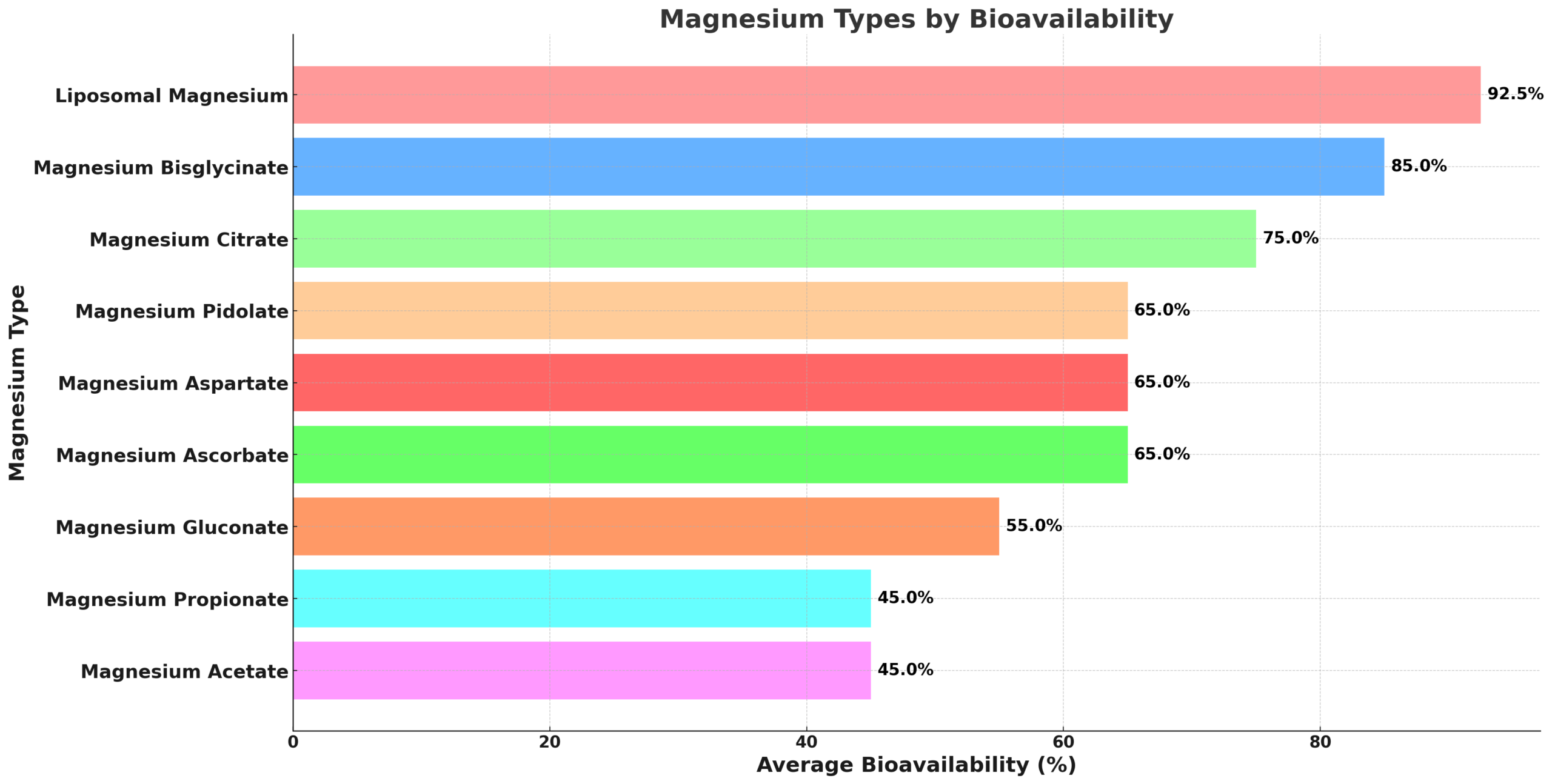The Role of Magnesium in the Body-Why Deficiency Shouldn’t Be Ignore
Magnesium, a seemingly innocuous element from the periodic table, plays a pivotal role in sustaining numerous vital bodily processes. This unsung hero of the mineral world is indispensable for converting the nutrients from our diets into usable energy, regulating the intricate workings of the nervous system, and facilitating the synthesis of new proteins – the building blocks of life itself.
Beyond these fundamental duties, magnesium’s influence extends to maintaining cardiovascular health by regulating blood pressure levels. It also plays a crucial part in the regulation of blood sugar, making it an ally for those battling metabolic disorders like diabetes. Furthermore, magnesium is an essential component in the formation of strong, resilient bones and the intricate double helix of our DNA.
Magnesium (Mg)- Nature’s Stress-Buster and Pain Reliever
While magnesium’s contributions to our physiology are undeniable, its therapeutic properties are equally noteworthy. The soothing effects of magnesium sulfate, better known as Epsom salt, have long been harnessed in baths to alleviate stress and muscle aches. Moreover, magnesium supplements are often recommended as a natural remedy for migraines, offering respite from debilitating headaches.
The Prevalence of Magnesium Deficiency
Despite magnesium’s indispensable role in maintaining optimal health, research indicates that a staggering half of the American population fails to consume adequate amounts of this vital mineral. While a true magnesium deficiency, or hypomagnesemia, is relatively uncommon, the consequences of insufficient magnesium intake can be far-reaching and detrimental to overall well-being.
Early Warning Signs- Recognizing the Subtle Symptoms
The initial signs of magnesium deficiency can be subtle and easily overlooked, often masquerading as symptoms of other health issues. Fatigue, loss of appetite, muscle spasms, nausea, and stiffness are among the first indicators that your body may be craving more magnesium. If left unaddressed, however, the consequences can escalate, leading to abnormal heart rhythms, numbness, tingling sensations, personality changes, and even seizures in severe cases.

What are the factors that deplete magnesium levels?
While magnesium deficiency can affect individuals of all ages and backgrounds, certain factors can heighten the risk of developing this condition. Individuals living with gastrointestinal disorders such as Crohn’s disease, celiac disease, or regional enteritis may struggle to absorb sufficient magnesium from their diets. Similarly, those battling type 2 diabetes or alcohol use disorder are also at an increased risk of magnesium inadequacy.
Age can also play a role, as our bodies become less efficient at absorbing magnesium as we grow older. Additionally, certain medications, including proton pump inhibitors, diuretics, bisphosphonates, and antibiotics, can interfere with magnesium absorption, further exacerbating the problem.
Replenishing Magnesium
Dietary Sources and Supplementation
Fortunately, addressing magnesium deficiency can be as simple as tweaking one’s dietary habits and, in some cases, incorporating supplements. For those seeking to boost their magnesium intake through food sources, a diverse array of options awaits.
Magnesium-Rich Foods
Leafy greens, dry beans, nuts, seeds, and whole grains are all excellent sources of magnesium. For a delightful and nutritious boost, consider incorporating a mango, avocado, and black bean salad into your meal plan – a delicious way to harness the magnesium-rich goodness of avocados and black beans.
|
Food |
Magnesium Content (per serving) |
| Pumpkin seeds | 156 mg |
| Chia seeds | 111 mg |
| Almonds | 80 mg |
| Spinach | 78 mg |
| Cashews | 74 mg |
| Peanuts | 63 mg |
| Soymilk | 61 mg |
| Black beans | 60 mg |
| Edamame | 50 mg |
| Peanut butter | 49 mg |
| Baked potato with skin | 43 mg |
| Brown rice | 42 mg |
| Low-fat plain yogurt | 42 mg |

Supplementing with Magnesium
For those who struggle to meet their magnesium needs through diet alone, supplements can offer a convenient solution. However, it’s essential to consult with a healthcare professional before embarking on a supplementation regimen, as they can provide guidance on the appropriate formulation and dosage based on your individual needs and any potential interactions with existing medications.
Magnesium supplements are available in various forms, including magnesium oxide, magnesium citrate, magnesium chloride, and magnesium lactate, among others. While there is no definitive scientific evidence favoring one form over another, a healthcare provider can help determine the most suitable option for your specific circumstances.
Magnesium- Separating Fact from Fiction
In recent years, the market has been inundated with topical magnesium products, such as sprays, oils, and gels, with claims of delivering magnesium effectively through the skin. However, the scientific community remains skeptical of these assertions, as there is currently insufficient evidence to support the efficacy of topical magnesium absorption.
Until more conclusive research emerges, it is advisable to prioritize dietary sources and oral supplements for addressing magnesium deficiency, rather than relying solely on topical applications.
Complications of Prolonged Magnesium Deficiency
Prolonged magnesium deficiency can lead to serious health issues, including compromised bone density, impaired nerve and muscle function, and digestive disturbances. In children, it can hinder proper bone development, while in older adults, it raises the risk of osteoporosis and fractures. Severe cases may result in life-threatening cardiac arrhythmias and chondrocalcinosis, a condition where calcium crystals abnormally deposit in cartilage.
Magnesium and Heart Health
The Cardiovascular Connection
The relationship between magnesium and cardiovascular health is a topic of significant interest in the medical community. Low magnesium levels have been associated with an increased risk of developing atrial fibrillation (AFib), a type of irregular heartbeat that can lead to serious complications if left untreated.
Additionally, magnesium deficiency has been linked to ventricular arrhythmias, which are abnormal rhythms originating in the heart’s lower chambers, and cardiac ischemia, a condition characterized by reduced blood flow to the heart muscle.
By maintaining adequate magnesium levels, individuals may potentially mitigate their risk of developing these cardiovascular issues, further underscoring the importance of this essential mineral in overall heart health.
Hyperparathyroidism and Magnesium Deficiency
Hyperparathyroidism, a condition characterized by excessive production of the parathyroid hormone, has been found to have a complex relationship with magnesium deficiency. Research suggests that individuals with hypomagnesemia (low magnesium levels) are more likely to experience typical symptoms of hyperparathyroidism, such as bone pain, bone fractures, kidney stones, increased urination, and excessive thirst.
Furthermore, those with both hypomagnesemia and hyperparathyroidism are at an elevated risk of developing anemia, osteoporosis, and potentially life-threatening hypercalcemic crises, which involve dangerously high levels of calcium in the blood.
Addressing magnesium deficiency in individuals with hyperparathyroidism may help alleviate some of the associated symptoms and reduce the risk of complications, highlighting the importance of maintaining optimal magnesium levels in this population.
Magnesium and Bone Health: Preserving Structural Integrity
Magnesium plays a crucial role in maintaining the structural integrity of our bone health, making it an essential mineral for individuals of all ages. In younger individuals, adequate magnesium intake is vital for proper bone growth and development, ensuring that the foundation for strong, resilient bones is laid during the formative years.
Conversely, in older adults, chronic magnesium deficiency can increase the risk of osteoporosis, a condition characterized by weakened and brittle bones that are more susceptible to fractures. By ensuring sufficient magnesium levels, individuals can potentially mitigate the risk of developing osteoporosis and reduce the likelihood of sustaining debilitating bone fractures as they age.
Magnesium and Muscle Function: Powering Performance
Magnesium is an indispensable mineral for optimal muscle function, making it a critical consideration for athletes, fitness enthusiasts, and individuals leading active lifestyles. This mineral plays a crucial role in facilitating muscle contractions and relaxation, enabling smooth and efficient movement.
Individuals with magnesium deficiency may experience muscle cramps, spasms, and twitching, which can impair performance and increase the risk of injury. By maintaining adequate magnesium levels through a balanced diet or supplementation, individuals can support their muscles’ ability to perform at their best, recover efficiently, and reduce the likelihood of exercise-related muscle issues.
Top 9 Magnesium APIs Manufactured by West Bengal Chemical Industries Limited
1. Magnesium Pidolate
Known for its high bioavailability and use in treating magnesium deficiency, particularly in conditions requiring enhanced magnesium absorption.
2. Magnesium Gluconate
Commonly used for magnesium supplementation, this API is preferred for its gentle effect on the digestive system and effective absorption.
3. Magnesium Bisglycinate
A chelated form of magnesium, widely used in supplements for its superior absorption and minimal gastrointestinal discomfort.
4. Magnesium Aspartate
This API is valued for its role in energy production and is often included in supplements targeting athletes and individuals with high energy demands.
5. Magnesium Acetate
Used in pharmaceuticals for magnesium supplementation and as a urinary alkalizer, this API is also applied in the textile and leather industries.
6. Magnesium Ascorbate Powder
A combination of magnesium and vitamin C, this API is used for its antioxidant properties and as a magnesium supplement with added immune support.
7. Magnesium Propionate
Utilized as both a magnesium supplement and a preservative in food and animal feed, this API offers dual benefits in various applications.
8. Liposomal Magnesium
An advanced form of magnesium encapsulated in liposomes for enhanced bioavailability, leveraging liposome drug delivery technology to ensure superior absorption and targeted therapeutic efficacy, widely used in high-end supplements and therapeutic applications.
9. Magnesium Citrate
Known for its effectiveness as a laxative and magnesium supplement, this API is commonly used in over-the-counter products to support digestive and overall health.
Magnesium and West Bengal Chemical Industries- A Commitment to Quality and Innovation
In the realm of magnesium salts manufacturing, West Bengal Chemical Industries stands as a beacon of excellence, committed to delivering high-quality products and innovative solutions. With a deep understanding of the vital role magnesium plays in human health and well-being, this esteemed company has dedicated itself to providing industry professionals and consumers alike with access to premium magnesium compounds.
Through rigorous quality control measures and a steadfast commitment to innovation, West Bengal Chemical Industries has solidified its position as a trusted partner for those seeking to address magnesium deficiency and promote overall wellness.
By collaborating with this industry leader, healthcare providers, researchers, and manufacturers can access a wide range of magnesium-based products, backed by the expertise and experience of a company that truly understands the significance of this essential mineral.


